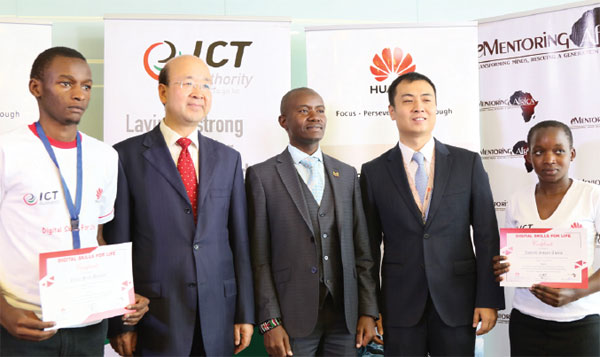Young and well-connected
By Lucie Morangi (China Daily Africa) Updated: 2017-05-07 14:19Huawei gives underprivileged Kenyan youths the skills for success in the world of IT
A training program funded by Huawei Technologies, the Chinese telecommunications giant, has opened up opportunities for 30 young Kenyans by equipping them with IT skills.
The program, known as Digital for Life, targeted underprivileged and entrepreneurial youths, between the ages of 20 to 25, who were financially disadvantaged and had no knowledge of IT. In collaboration with the government of Kenya and private partners, the $30,000 project equipped them with various skills relevant to the information and communication technology sector, widely considered the emerging engine of growth for the country's economy.
According to the government, of the 80 percent of the country's youth who are unemployed, 90 percent lack vocational training.
|
In collaboration with the government of Kenya and Huawei Technologies, a $30,000 project has equipped Kenyan students with various skills relevant to the information and communication technology sector. Provided to China Daily |
Existing capacity-building programs have previously targeted graduates, notes Eunice Kariuki, director of partnership, innovation and capacity at the ICT Ministry.
"There was a yawning gap that left out disadvantaged youths. Huawei has heeded our calls and given these youths opportunities to be employed and create employment opportunities," she says.
Over six months, the youths underwent training in entrepreneurship and leadership, together with technical training for two months. They have become candidates for recruitment in government-led initiatives such as Ajira Digital, which enables young people to work and earn online.
"This program clearly demonstrates what partnership and collaboration between the government and the private sector can do. These youths have been given a real chance of pursuing better life opportunities that will not only impact them, but also build national productivity," says Joe Mucheru, cabinet secretary in the ICT Ministry.
He adds that unemployment can be an overwhelming problem for the government which it cannot shoulder the responsibility of empowering youth alone. The government has an initiative to expand the national ICT infrastructure to give equal opportunities to young people and women, both in urban and rural areas.
In 2014, about 400,000 graduates entered the job market, with only 103,000 formal job opportunities available. About 40 percent of Kenyans of employable age do not have jobs.
"Kenya is ardently working toward building Africa's 'Silicon Savannah'. To achieve this, we need to rapidly build a skilled workforce," he says.
Agreeing with these sentiments, Yu Dingpeng, chief executive of Huawei Technologies in Kenya, says his company has steadily transformed the IT landscape over the last 19 years. The company was behind the mobile technology transformation from 2G to 3G and now 4G, says Yu. The global mobile industry is now testing 5G.
"Kenya has moved from using copper wires to fiber. We have deployed infrastructure for M-pesa, a revolutionary mobile money transfer technology, and a security system that is creating better-paying job opportunities for Kenyans. We are therefore keenly exploring ways of transferring knowledge to the people and bringing them online," he says.
He adds that, out of 2,000 applicants, only 30 qualified for the program.
"I believe that this program will catalyze a transformative change back to the communities. More people should be able to access the internet and improve their lives. We already have a successful graduate program, and it is our pleasure to invest in these youths, who are bringing a different dynamism into the landscape," says Yu.
Growth in Africa's IT sector hinges on the number of users online. The continent is lagging behind on internet penetration, standing at 27.7 percent against the world average of 49.6 percent. Internet use is 9.3 percent while global usage has reached 90.7 percent, according to the International Telecommunication Union.
Experts believe that inexpensive mobile phones and mobile broadband connections will drive internet access and usage.
lucymorangi@chinadaily.com.cn
- 'Cooperation is complementary'
- Worldwide manhunt nets 50th fugitive
- China-Japan meet seeks cooperation
- Agency ensuring natural gas supply
- Global manhunt sees China catch its 50th fugitive
- Call for 'Red Boat Spirit' a noble goal, official says
- China 'open to world' of foreign talent
- Free trade studies agreed on as Li meets with Canadian PM Trudeau
- Emojis on austerity rules from top anti-graft authority go viral
- Xi: All aboard internet express












